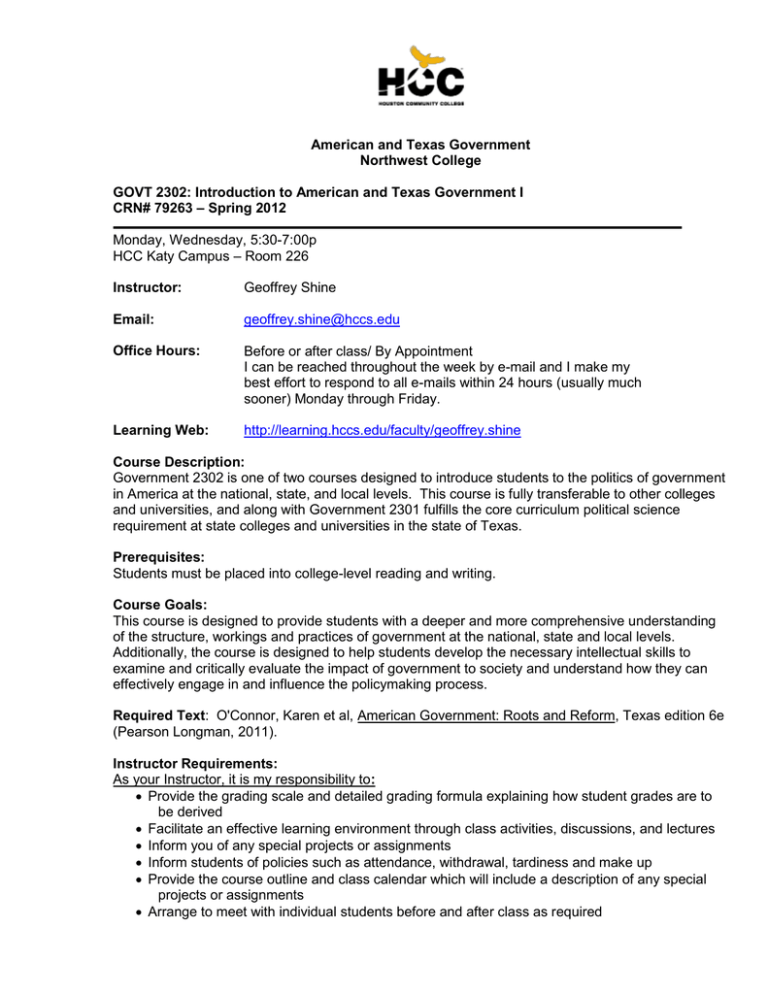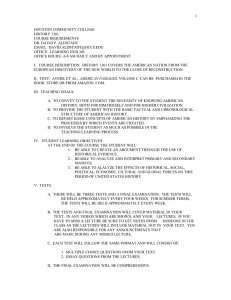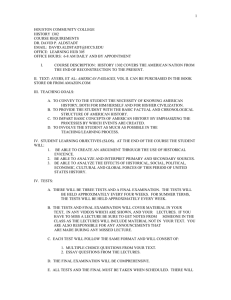
American and Texas Government
Northwest College
GOVT 2302: Introduction to American and Texas Government I
CRN# 79263 – Spring 2012
Monday, Wednesday, 5:30-7:00p
HCC Katy Campus – Room 226
Instructor:
Geoffrey Shine
Email:
geoffrey.shine@hccs.edu
Office Hours:
Before or after class/ By Appointment
I can be reached throughout the week by e-mail and I make my
best effort to respond to all e-mails within 24 hours (usually much
sooner) Monday through Friday.
Learning Web:
http://learning.hccs.edu/faculty/geoffrey.shine
Course Description:
Government 2302 is one of two courses designed to introduce students to the politics of government
in America at the national, state, and local levels. This course is fully transferable to other colleges
and universities, and along with Government 2301 fulfills the core curriculum political science
requirement at state colleges and universities in the state of Texas.
Prerequisites:
Students must be placed into college-level reading and writing.
Course Goals:
This course is designed to provide students with a deeper and more comprehensive understanding
of the structure, workings and practices of government at the national, state and local levels.
Additionally, the course is designed to help students develop the necessary intellectual skills to
examine and critically evaluate the impact of government to society and understand how they can
effectively engage in and influence the policymaking process.
Required Text: O'Connor, Karen et al, American Government: Roots and Reform, Texas edition 6e
(Pearson Longman, 2011).
Instructor Requirements:
As your Instructor, it is my responsibility to:
Provide the grading scale and detailed grading formula explaining how student grades are to
be derived
Facilitate an effective learning environment through class activities, discussions, and lectures
Inform you of any special projects or assignments
Inform students of policies such as attendance, withdrawal, tardiness and make up
Provide the course outline and class calendar which will include a description of any special
projects or assignments
Arrange to meet with individual students before and after class as required
To be successful in this class, it is the student’s responsibility to:
Attend class and participate in class discussions and activities
Read and comprehend the textbook
Complete the required assignments and exams
Ask for help when there is a question or problem
Keep copies of all paperwork, including this syllabus, handouts and all assignments
Classroom Behavior:
Be sure that all electronics are off and not to be used during class. Please be sure that cell phones
are completely off (this does not mean vibrate mode is acceptable) as to ensure that all students can
concentrate and ensure an undisruptive environment for learning. Laptops, tablets, etc. are ok for
note taking, but limit your activities to taking notes only on these devices. First offense will result in
a warning; second offense will result in loss of privilege to use the device in the class.
You are all expected to act as adults. This is a college course and everyone in class is coming to
learn. Be sure that you respect the classroom each time you step foot in class. Be courteous of your
classmates and be respectful of the professor. Any other behavior, i.e. sleeping, speaking out of
turn, talking on a cell phone, fighting in class, etc. will not be tolerated. Any behavior that is deemed
inappropriate will be called out in class. If it continues, you will be asked to leave the classroom or
will be assisted by security.
Attendance Policy:
Be sure that you are here every day to ensure that you understand the material and will succeed in
the course. I will take attendance within the first 10 minutes of when class begins and will not take it
again during class. Be sure that you are there at that time otherwise you will not be counted for the
day. Excessive tardiness and leaving early are not acceptable behavior in class and will count
against your participation grade, so be sure that you respect the classroom by coming on time and
staying for the entire duration of class. If there is a problem, or if you need to leave class for any
reason, please let me know before class starts.
Grading Policies:
Grading Scale:
A = 90-100
B = 80 – 89
C = 70 – 79
D = 60 – 69
F = 0 – 59
Course Grading Structure:
1 Exam (15%)/ 1 Quiz (5%)
5 Class Projects
1 Semester Assignment
Participation
20%
40%
30%
10%
100%
Assignments:
Your grade in this course will be based on the average of 5 in-class projects, which will count for
40% of your grade, one major semester project which will count for 30%, 1 mid-term exam worth
15%, a syllabus quiz worth 5% and a participation grade, which makes up the final 10% of your
grade. It is imperative that you keep up with the assigned readings as well.
Exams:
There will be one, take home mid-term exam in this course. This exam will consist of multiple-choice,
matching, and possibly fill in the blank, identification, and short answer questions and combined
represent a total of 15% of your grade. There will also be a quiz over the syllabus conducted the first
week of class. This quiz will be worth 5% of your course grade.
Make-up Work:
There will be no make-up work for the semester.
Instructional Methods:
As an instructor, I am committed to helping each of you achieve your academic goals for the course.
It is my responsibility to provide each student with a firm foundation of knowledge related to
American and Texas government.
This is a lecture course. Instruction includes the use of lecture materials, collaborative activities in
the classroom and other supplemental resources as provided by the instructor.
Additionally, discussion will be a critical aspect of the course. It is my belief that discourse helps
students move beyond memorization of the material and into critical analysis and evaluation of the
concepts and theories examined in the course. You will be involved in discussions with your
classmates and your instructor. In order to contribute to these discussions, you will need to stay
prepared by following the reading the schedule, attending class regularly, submitting assignments on
time, taking advantage of the supplemental resources provided by the instructor (including any
enrichment exercises) and fully participating in every aspect of the course.
I am committed to your success and hope that you are too!
Textbook Readings:
It is important that you follow the reading schedule. While it may be tempting, do not fall behind on
your reading. To avoid becoming overwhelmed with the material, pace yourself by maintaining the
reading schedule as printed. The textbook is complementary to the lecture notes, supplemental
readings, assignments and your personal note taking. Ensure your personal success in the course
by staying prepared and engaged!
Students with Disabilities (ADA Statement)
Any student with a documented disability (e.g. physical, learning, psychiatric, vision, hearing, etc.)
who needs to arrange reasonable accommodations must contact the Disability Services Office (713718-5422) at the respective college at the beginning of each semester. Faculty is authorized to
provide only the accommodations requested by the Disability Support Services Office.
For questions, please contact Donna Price (District) at 713.718.5165 or the Disability Counselor at
Northwest College Mahnaz Kolaini – 713.718.5422. To visit the ADA Web site, please visit:
www.hccs.edu then click “Future students,” scroll down the page and click on the words Disability
Information.
Academic Dishonesty, Plagiarism and Collusion:
I will follow HCC policy for any and all academic dishonesty, plagiarism and collusion. Any form of
cheating, including plagiarism, will result in a zero (F) for that particular graded activity. You may also
receive a grade of (F) for the course. Identified instances of cheating will also be reported to the
college and could result in administrative withdrawal. Please note that you will not be allowed to
leave the classroom during the testing process.
Scholastic dishonesty includes, but is not limited to, cheating on a test, plagiarism, and collusion.
Cheating on a test includes copying from another student's test paper; using, during a test, materials
not authorized by the person giving the test; collaborating with another student during a test without
authority; knowingly using, buying, selling, stealing, transporting, or soliciting in whole or part the
contents of an unadministered test; or bribing another person to obtain a test that is to be
administered. ‘Plagiarism’ means the appropriation of another's work and the unacknowledged
incorporation of that work in one's own written work for credit. ‘Collusion’ means the unauthorized
collaboration with another person in preparing written work offered for credit."
For further clarification on what is considered academic dishonesty and/or cheating, in simplified
terms it is (1) taking unchanged passages (or slightly edited) from another person's writing and
portraying them as one's own; (2) submitting a paper that includes paraphrases of another person's
writing without giving credit; (3) having someone else write your paper for you; (4) copying or using
another person's work during in-class writing or testing; (5) the unauthorized use of electronic
devices during in-class writing or testing; and (6) violating testing rules. Keep in mind also that
whether you are cheating or not, not following testing or writing rules properly, such as
communicating with your neighbor or using a cell phone during a test will be construed as cheating.
This is not an exhaustive list of the forms of cheating on written work. If you are in doubt, consult
your instructor.”).
Class Attendance and HCC Course Withdrawal Policy
If you feel that you cannot complete this course, you will need to withdraw from the course prior to
the final date of withdrawal. Before you withdraw from your course; please take the time to meet with
me to discuss why you feel it is necessary to do so. I may be able to provide you with suggestions
that will enable you to complete the course. Your success is very important to me! HCC policy
provides that students may be dropped after missing more than six hours of class time. While I have
the capacity to withdraw you from the course, I will not automatically withdraw you from the
course due to excessive absences. If you don’t attend class and fail to withdraw from the course,
you will receive a grade in the course. You must withdraw yourself from the course by the
deadline. Additionally, you may now withdraw yourself online (see “How to Drop” section
below).
The last day that you may be withdrawn from the course is Thursday March, 29 at 4:30 p.m. After
this date, you will receive a grade (not a W) in the course.
ADDITIONAL REQUIRED WITHDRAWAL POLICY (STATE OF TEXAS POLICY):
Students who take a course for the third time or more must now pay significant tuition/fee increases
at HCC and other Texas public colleges and universities. At HCC it is an additional $50 per credit
hour. If you are considering course withdrawal because you are not earning passing grades, confer
with your instructor/counselor as early as possible about your study habits, reading and writing
homework, test-taking skills, attendance, course participation, and opportunities for tutoring or other
assistance that might be available. Also, the state of Texas has passed a new law limiting new
students (as of Fall 2007) to no more than six withdrawals throughout their academic career in
obtaining a baccalaureate degree.
HOW TO DROP:
•
If a student decides to withdraw from a class upon careful review of other options, the student
can withdraw online prior to the deadline through their HCC Student Center.
•
HCC and/or professors may withdraw students for excessive absences without notification
(see Class Attendance below).
•
Students should check HCC’s Academic Calendar by Term for withdrawal dates and
deadlines. Classes of other duration (flex-entry, 8-weeks, etc.) may have different final withdrawal
deadlines. Please contact the HCC Registrar’s Office at 713.718.8500 to determine mini-term class
withdrawal deadlines.
IMPORTANT: Students are now able to withdraw from one or more of their classes online. While it is
still advisable that student receive good counsel from instructional and counseling faculty prior to
dropping one or more classes, students will no longer be required to “see” someone before they will
be allowed to drop. They will be provided information related to the implications and possible
consequences of dropping their courses. The following will occur when a student selects the “drop”
option during an enrollment request:
• Students will be required to select a drop reason in order to complete the withdrawal request (the
drop reason will cue whether the dropped course will count toward the 6 drop rule or not).
• Students will be invited to click on several links to learn more of the implications of dropping on the
six-drop rule (on veterans, on financial aid, and on international students):
(http://imc02.hccs.edu/gcac/drop.htm).
• Students will be required to acknowledge the implications of withdrawing from a class.
The last day for an administrative /student withdrawal is: Thursday, March 29 by 4:30p
HCC EARLY ALERT:
The HCC Early Alert Initiative is a college-wide effort to successfully retain students who are at risk
of failing, withdrawing or dropping a course. This joint effort between Instruction and Student
Services identifies students that are performing poorly in the classroom so that effective support
services can be provided to the student.
PERFORMANCE EARLY INTERVENTION:
I am committed to helping you achieve your academic goals. If you find that you are not performing
at a level you are pleased with, it is vitally important that you make every effort possible to seek
immediate assistance. Please keep in mind that there are only three tests in the course. Failing even
one test may be detrimental to your final grade. If you do not perform well on the first exam, or you
find that your quiz/assignment scores are weak, please see me immediately! Do not wait until the
week before the final exam to turn things around!
EGLS3 -- Evaluation for Greater Learning Student Survey System
At Houston Community College, professors believe that thoughtful student feedback is necessary to
improve teaching and learning. During a designated time, you will be asked to answer a short online
survey of research-based questions related to instruction. The anonymous results of the survey will
be made available to your professors and division chairs for continual improvement of instruction.
Look for the survey as part of the Houston Community College Student System online near the end
of the term.
HCC Policy Statements
Access Student Services Policies on their Web site:
http://hccs.edu/student-rights
Course Outline for Reading and Testing
Instructor reserves the right to add, delete or revise segments of this outline during the semester as needed.
WEEK 1: JANUARY 16
Introduction and Syllabus
WEEK 2: JANUARY 23
National & State Legislatures
WEEK 3: JANUARY 30
WEEK 4: FEBRUARY 6
Project 1
National & State Executives
WEEK 5: FEBRUARY 13
Project 2
WEEK 6: FEBRUARY 20
National & State Courts
WEEK 7: FEBRUARY 27
Project 3
WEEK 8: MARCH 5
Civil Rights and Liberties
Take Home Mid-term:
Assigned March 6 – Due March 8
WEEK 9: MARCH 12
Spring Break March 12 -18 – NO CLASS
WEEK 10: MARCH 19
Civil Rights and Liberties con’t.
WEEK 11: MARCH 26
Social Policy
WEEK 12: APRIL 2
Project 4
WEEK 13: APRIL 9
Economic Policy
Last Day to Drop: April 10
WEEK 14: APRIL 16
WEEK 15: APRIL 23
WEEK 16: APRIL 30
Project 5
Foreign and Defense Policy
Final Project Due






